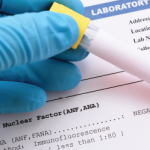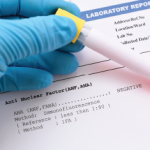IFA Codes
Quest: 38318
LabCorp: 164947
WellPoint, BCBS Change Policy at ACR’s Request
After receiving a letter from the ACR, WellPoint agreed that it is no longer necessary to request a new authorization if moving a patient on etanercept to a different dosing schedule (e.g., from 50 mg to 25 mg twice weekly). In addition, WellPoint revised the Enbrel PAB form to remove the question regarding “systemic malignancy within the last five years.”
Additionally, after receiving a letter from the ACR, Blue Cross and Blue Shield of Massachusetts has agreed to update its policy in the fall to cover anti-CCP testing for rheumatoid arthritis, stating, “anti-CCP testing is now considered medically necessary for the diagnosis of rheumatoid arthritis.”
The ACR has long advocated for its members’ issues relating to health plan policy and has had many successes in this area. Through letters sent by CORC, positive changes have occurred.
Use Correct Lab Code to Get Correct ANA Test
Immunofluorescence assay (IFA) continues to be the gold standard to test for antinuclear antibodies (ANAs), and physicians can order these tests from commercial laboratories.
During the past decade, commercial clinical laboratories have adopted a wide variety of new tests, including solid-phase assays, for the detection of ANAs. Some commercial laboratories have adopted these new assays to replace traditional “gold standard” indirect immunofluorescence tests to screen for ANAs. The new solid-phase assays detect up to 13 specific autoantibodies, while indirect immunofluorescence using Hep-2 cell substrate detects more than 100 clinically relevant autoantibodies, which is why the task force is making its recommendation.
The potential problem with screening sera for ANAs using the limited number of autoantigens that are present in solid-phase assays was illuminated in a recent case record of the Massachusetts General Hospital (NEJM. 2009; 360:711-720), where the diagnosis of systemic lupus erythematosus was significantly delayed because of a false-negative ANA test result that was determined using a non-indirect immunofluorescence method.
Over the past two years, the ACR ANA Taskforce—which was established as a result of the growing concerns ACR members had over this topic—has carefully reviewed the available literature concerning newer, solid-phase assays for the detection of ANAs. These solid-phase assays were developed to detect a limited number of specific autoantibodies in the serum of patients with autoimmune diseases. Although some of these tests have been approved by the Food and Drug Administration for use in screening for ANAs, the taskforce did not find sufficient evidence to conclude that solid-phase screening assays are equivalent to indirect immunofluorescent assays for the detection of ANAs.
Some of the central, commercial laboratories have ordering codes that permit the ordering physician to specifically request that testing be performed by IFA, but often these codes are elusive to find, and sometimes it is difficult for primary care physicians, other physicians, and even rheumatologists to realize which test is being ordered.
The taskforce is alerting the membership that ANA testing by IFA is still available. The code for Quest is 38318. Quest has another ANA test choice, 19946, but this is a solid assay and is not recommended as a screening test for ANAs. LabCorp also has an ANA IFA code, 164947.
For more information about this topic, read “Know Your Labs” in the February 2009 issue of The Rheumatologist (p. 1), or visit www.rheumatology.org to read the ACR’s position paper encouraging commercial laboratories to utilize the IFA test to detect ANA. You can also participate in the conversation by joining the ACR’s advocacy list serve; visit www.rheumatology.org to subscribe.

